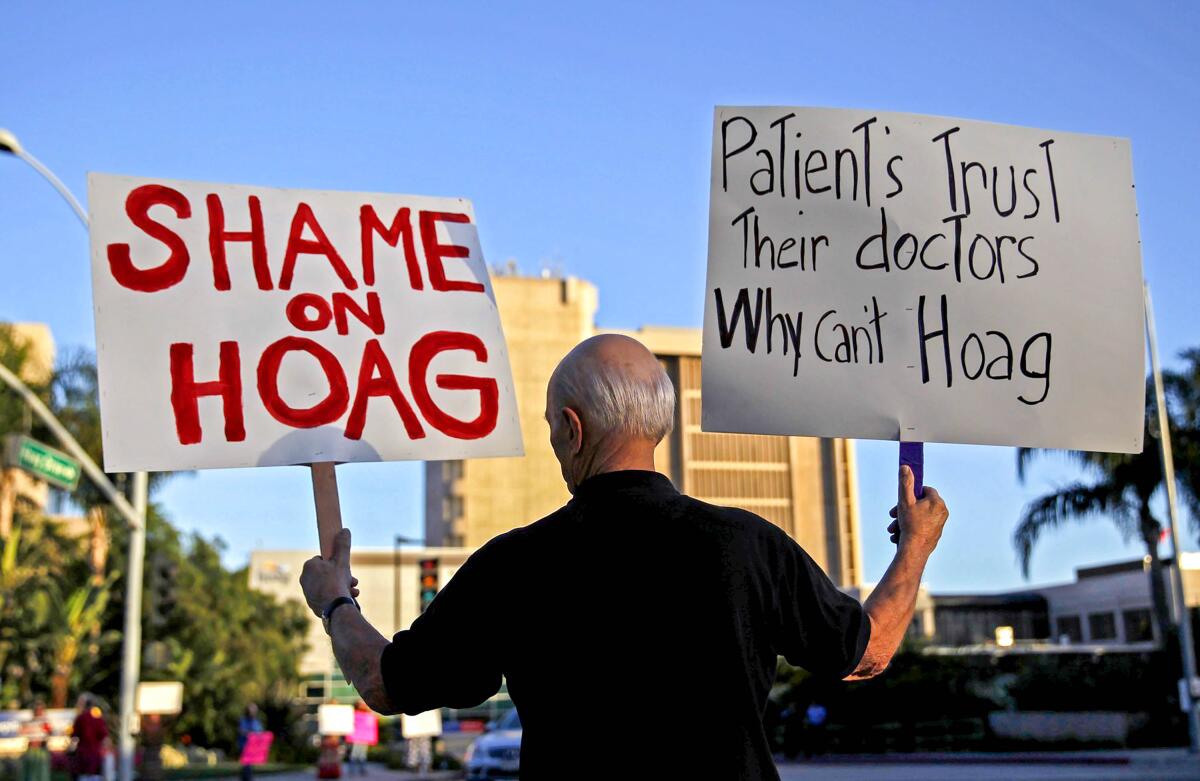Hoag hospital finally extricates itself from the heavy hand of Catholic healthcare

- Share via
After nearly 10 years of suffering from increasingly intrusive interference with women’s healthcare, Hoag Memorial Hospital has finally managed to extricate itself from its affiliation with a giant Catholic hospital chain.
California Atty. Gen. Rob Bonta on Monday gave his approval to Hoag’s split from Renton, Wash.-based Providence St. Joseph Health, the nation’s fourth-largest Catholic hospital system, as of Jan. 31. Bonta’s signature ends a saga that began in May 2020, when Hoag first sought to dissolve the affiliation.
Providence opposed the dissolution, prompting Newport Beach-based Hoag, one of Orange County’s elite hospitals, to file a lawsuit to overcome the chain’s objections.
Hoag Hospital’s leadership deserves praise for having the courage to see that the affiliation was a bad idea, and fighting to end it.
— Lois Uttley, Community Catalyst
According to an agreement attached to Bonta’s approval, the split will allow Hoag to offer a “full range” of fertility and family planning services. The hospital says it aims to recruit nationally recognized experts to create a specialized women’s medical group as part of a general expansion of women’s health services. In effect, that means an end to church-driven constraints on women’s healthcare at Hoag.
A press release issued jointly by Hoag and Providence described the split as amicable. But that only serves to paper over the rancor that accompanied Hoag’s effort to end the affiliation. In February, Hoag accused Providence of retaliating against it; among other steps, Providence removed Hoag’s name and insignia from its website’s listing of its Southern California facilities.
Get the latest from Michael Hiltzik
Commentary on economics and more from a Pulitzer Prize winner.
You may occasionally receive promotional content from the Los Angeles Times.
In June 2020, Providence dropped Hoag’s specialists from St. Joseph Heritage Healthcare, its network of medical providers for managed care plans in Southern California — but didn’t inform patients of the change until late November, giving them scant time to find new specialists before they had to choose their healthcare plans for 2021.
A few weeks later, Providence informed Heritage members that they would lose access to Hoag’s 13 urgent care centers by the end of December, in the teeth of the pandemic.
Throughout most of the affiliation period, Heritage refused to pay for contraceptives prescribed by Hoag OB/GYNs for their patients. As its grounds for refusing payment, the HMO cited the Ethical and Religious Directives for Catholic Health Care Services — the document produced by the U.S. Conference of Catholic Bishops that governs Catholic hospitals and their affiliated institutions.
The HMO took that position even though the 2014 agreement under which then-Atty. Gen. Kamala Harris approved the Hoag/St. Joseph affiliation explicitly stated that Hoag would not be bound by the so-called ERDs then or “in the future.” The ERDs prohibit hospitals under its jurisdiction from providing contraceptives.
Religious constraints on women’s services weren’t the only category of Hoag professionals’ discontent with Providence. They also complained that promises that the affiliation would produce an institution more responsive to community needs were not fulfilled.
Via Nina Martin of ProPublica comes word that America’s Catholic bishops are moving toward tightening religious restrictions on physicians and nonsectarian hospitals that join with them in mergers and partnerships.
The dissolution of the Hoag/Providence affiliation marks one of the few cases in which the steady expansion of Catholic healthcare in the U.S., which now accounts for 1 in 6 acute care beds in the nation, has been halted or reversed.
An agreement linking the nonsectarian Sierra Vista Medical Center in Tucson with the Catholic Carondelet Health System was dissolved in 2011, after administrators refused a doctor permission to perform an emergency pregnancy termination for a patient suffering a miscarriage.
A proposed affiliation between UC San Francisco and Dignity Health, a leading Catholic system, was blocked over concerns about Dignity’s adherence to the ERDs and concerns they would be applied to UCSF patients, staff and trainees. The UC Board of Regents ultimately crafted strict rules guaranteeing independence from the ERDs for UC services performed at Catholic hospitals.
“Hoag Hospital officials apparently became disillusioned with the Providence Health System not only because of having to cope with Catholic health restrictions, but also because the big promises of improvements to access and quality of care were not realized,” Lois Uttley, director of the women’s health program at Community Catalyst, a healthcare advocacy organization, told me.
“Instead, Hoag Hospital officials faced pressures to standardize processes and care in a way that would not benefit the community that relies on this hospital,” Uttley said. “Hoag Hospital’s leadership deserves praise for having the courage to see that the affiliation was a bad idea, and fighting to end it.”
As I’ve observed on numerous occasions, Hoag’s affiliation with Providence was conceived and born in deceit.
When the arrangement was launched in August 2012, the managements of Hoag and what was then St. Joseph Health System, a Roman Catholic chain with five hospitals in Orange County, assured Hoag’s staff and the public that both entities would “retain their individual identities and faith affiliations — Presbyterian and Catholic, respectively.”
UC is still grappling with its policies on affiliating with hospitals with religious restrictions on care.
Hoag’s medical staff was repeatedly and explicitly assured that nothing in their practice would change due to the partnership. Instead, just weeks after the deal was made final in early 2013, abortions were banned at Hoag.
Hoag Chief Executive Robert T. Braithwaite and then-Chairman Gary McKitterick implied that they ended abortions at the hospital because Hoag doctors performed so few of them that they couldn’t maintain “clinical excellence” in the procedure, and therefore patients were better off having them done elsewhere.
Eight Hoag OB/GYNs wrote an open letter in response informing Braithwaite and McKitterick that they didn’t know what they were talking about. “We are experts in providing the ‘full array of reproductive family planning services’ to which they refer as lacking at Hoag,” they wrote.
I reported at the time, the truth was that St. Joseph had made the abortion ban a condition of the partnership agreement. It had nothing to do with “clinical excellence,” and everything to do with Catholic religious doctrine.
Hoag’s underhanded abortion ban
After St. Joseph merged with Providence Health & Services in 2016, creating the nation’s fourth-largest Catholic hospital chain, the shadow of Catholic healthcare restrictions on Hoag grew heavier, according to Hoag physicians. Harris had mandated as a condition of the original Hoag/St. Joseph agreement that Hoag be exempt from all ERD restrictions other than a ban on “direct abortions.”
Harris required that the merged enterprise accept all the conditions she had imposed on the Hoag/St. Joseph partnership in 2014, including the ERD ban. Unwisely, however, she stipulated that St. Joseph could ban “direct abortions” at Hoag. That’s not a medical term, but a Catholic term; Hoag doctors discovered that it opened the door for church functionaries to interfere with the physicians’ relationships with their patients.
According to a confidential letter that several Hoag physicians filed in October 2020 with then-Atty. Gen. Xavier Becerra, in 2016 an anonymous complaint to the Catholic bishop of Orange County prompted Providence to demand “a full investigation guided by their appointed Catholic ethicist” of 13 separate medical procedures involving medical services protected by the attorney general’s conditions.
In each case a pregnancy was terminated at a physician’s private office, with a follow-up procedure at the hospital “for the safety of the women ... given the timing of the pregnancies at issue and the risks to our patients.”
Providence decreed that these procedures constituted direct abortions and accused Hoag of violating the attorney general’s conditions. This episode was confirmed by a Hoag insider who told me that no disciplinary action was taken, but that the entire affair “had a chilling effect on providers of women’s healthcare at Hoag.”
More to Read
Get the latest from Michael Hiltzik
Commentary on economics and more from a Pulitzer Prize winner.
You may occasionally receive promotional content from the Los Angeles Times.











